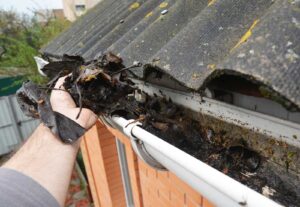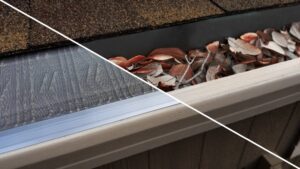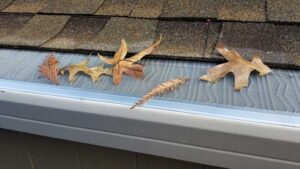Your Guide to the Different Types of Gutter Guards
Your home is your fortress but that fortress can get damaged by Mother Nature.
It’s not only massive events like tornadoes and hurricanes that damage your home. Wind and rain can cause catastrophic damage by filling gutters with debris. The result is destruction to your property.
You want to protect your biggest investment, right? But let’s face it, no one wants to clean their gutters. It’s a messy, time-consuming process that ends up giving you a ton of headaches.
You can make the process easier by hiring a company to do it for you or by installing gutter guards. In this guide, we give you the rundown on the different types of gutter guards so you can make the best decision to protect your home.
What is a Gutter Guard?
Gutters get installed under the eaves of your roof along the edge. They protect your home by collecting rain and running it away from your house.
A gutter guard protects the gutters by collecting debris so it doesn’t clog up the gutters. In simple terms, they allow the gutters to do their job.
Do I Need Them?
Gutter guards won’t prevent your gutters from needing maintenance. Your guard system will still need periodic cleaning. But they reduce the debris buildup which can cause roof leakage, foundation issues, and other water damage.
A new roof costs around $7,500 but can go as high as $30,000. Repairing your foundation can run you another $4,000. Keeping your gutters maintained and installing gutter guards sounds a lot better, doesn’t it?
Types of Gutter Guards
The best type of gutter guards are the ones that fit well and get the job done. Homeowners care about the aesthetic of their home too, so choosing the best gutter covers is about personal taste, too.
There are several types of guards and they all have unique qualities and features. To find the best gutter guard system for your home, you need to understand all your options.
Surface Tension / Reverse Curve Guards
Reverse curve or surface tension gutter guards are sheets of material that get installed at an angle. Water channels into a small opening while debris passes over. This type of guard is more visible and more expensive.
Pros:
- Installed by professionals so the job’s done right
- Some come with a warranty
- Effective at keeping debris, snow, and ice off roofs and gutters
- Also effective in keeping birds or rodents out of your gutters
- Creates a surface unsuitable for bird or rodent nests
Cons:
- Can lift up roof shingles, which could void your roof warranty
- Lower your home’s curb appeal
- Cost of installation can get pricey if the company insists you need new gutters
- Clogs can form at the opening
- Can get damaged by falling branches or large debris
- Can limit water flow which increases the chance of overflow
Mesh Guards
Mesh guards are screens made from vinyl, plastic, or metal. They rest on top of your gutters, preventing debris from falling in. Leaves and smaller debris wash over the guard keeping it off your roof.
Pros:
- Easy to install
- Lightweight so your gutters won’t warp or get compromised
- Effective at preventing clogs from smaller debris
- Works with various roof types, including older roofs
- Easy maintenance
Cons:
- Can limit water flow which increases the chance of overflow
- May not last as long as other gutter guards if plastic
- Can get damaged by falling branches or large debris
Foam Guards
Works in the same way mesh screens do both in installation and function. Foam guards get placed into the gutter and create a screen for water to pass through. In the process, debris passes over and stays off your roof.
Typical foam guards are pyramidal in shape. They have a flat edge that lays against the side of the gutter on the roof side. A channel forms that allows water to flow beneath the guard.
Pros:
- Easy to install
- Cost-effective
- Treated with chemicals to prevent moss or mildew growth
- Prevents large debris from getting into the gutter
Cons:
- Small debris can clog the system
- Accumulating oil from tar paper and other roofing materials can cause the foam to lose its effectiveness
- Needs to get replaced between one to two years
Every system needs proper maintenance to function effectively. Proper installation is also important for the guard to do its job.
Only Trust Professionals to Maintain Your Home
Now that you know the different types of gutter guards, you have a better understanding of what system works best for your home. Remember, a gutter guard can only do so much. Keeping your gutters clean is paramount for the safety of your house and your family.
If you don’t want to do it alone, the good news is you don’t have to! Choose a company that cares as much about your home and family as you do. Labor Panes is that company.
We offer a 100% satisfaction for all our services. We provide exceptional gutter cleaning, window cleaning, and pressure washing in the Charlotte Metro area. Contact us today for your free quote.


